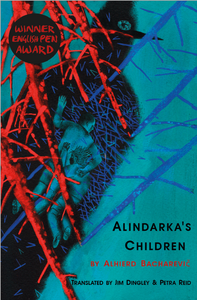Alhierd Bacharevič, Alindarka’s Children (2014)
Translated from the Russian and Belarusian by Jim Dingley and Petra Reid (2020)
This novel by Belarusian author Alhierd Bacharevič is an act of assertion, perhaps even reclamation. It begins with Alicia and Avi, two children interred in a camp whose purpose is to ‘correct’ their language, make them speak Russian rather than Belarusian. The children’s father helps them escape, and they flee into the forest, though the camp leaders won’t let them go that easily…
There’s a fairytale atmosphere to this story, with the mysterious forest seeming almost a character in its own right – the children even come across a gingerbread house of sorts. It’s also a novel about language: we meet the camp’s Doctor who seeks medical ‘cures’ for what he sees as the speech defect of Belarusian. Speaking Belarusian – and writing the novel partly in that language – then becomes an act of resistance.
This carries over to the translation, which is an act of assertion in its own right. The Russian in the original appears as English in the translation, but the Belarusian has been translated on into Scots. It’s an idea that preserves the power relationship between the two languages of the original – not to mention that it forces readers of the ‘dominant’ language to work harder.
There are also lines of Belarusian poetry scattered throughout the book. Rather than being translated, these have been substituted for Scots poetry. I have to admit the use of Scots sometimes left me seeing the characters as more Scottish than Belarusian – your mileage may vary. Still, I found Alindarka’s Children a thought-provoking piece of work.
Published by Scotland Street Press.
Read my other posts on the 2021 Republic of Consciousness Prize here.

Recent Comments